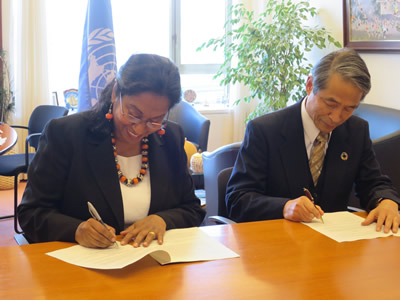Strengthening the technological capabilities of developing countries is paramount for the achievement of the 2030 Agenda for Sustainable Development.
UNCTAD and Okayama University in Japan have joined forces to foster and nurture young scientific talent in developing countries.
They have come together to offer joint research and training courses to young female scientists from developing countries and opportunities for doctoral studies to young scientists from those countries.
They will implement the joint work under a path-breaking memorandum of understanding they signed on 9 January.
“Fostering and nurturing young scientific talent in developing countries is critical to helping them leverage science, technology and innovation to achieve the sustainable development goals”, said Shamika N. Sirimanne, UNCTAD’s director of technology and logistics, during the signing ceremony.
Bolstering capacities for sustainable development
Strengthening the technological capabilities of developing countries is paramount for the achievement of the 2030 Agenda for Sustainable Development.
Ms. Sirimanne said the agreement with Okayama University would strengthen UNCTAD’s ability to support developing countries in this effort.
“We’re pleased with our cooperation towards human capital development in science, technology and innovation to achieve the global goals. We’ll continue to contribute to the improvement of the wellbeing of all,” said Hirofumi Makino, president of Okayama University.
The first phase of the joint initiative, set to run from August 2020, will offer five young female scientists from developing countries the opportunity to participate in joint research and training programmes in Japan.
The beneficiaries will be selected through an application process that Okayama University and UNCTAD will manage in collaboration with countries’ permanent missions in Geneva, Switzerland.


